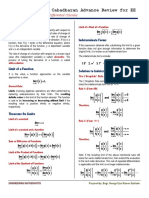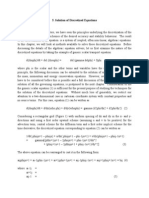0 ratings0% found this document useful (0 votes)
18 viewsPython Functions Tables
Uploaded by
yohanmathew1906Copyright
© © All Rights Reserved
We take content rights seriously. If you suspect this is your content, claim it here.
Available Formats
Download as DOCX, PDF, TXT or read online on Scribd
0 ratings0% found this document useful (0 votes)
18 viewsPython Functions Tables
Uploaded by
yohanmathew1906Copyright
© © All Rights Reserved
We take content rights seriously. If you suspect this is your content, claim it here.
Available Formats
Download as DOCX, PDF, TXT or read online on Scribd
You are on page 1/ 3
Python Functions Table
Functions That Return Values
Category Function/Method Description Example
Built-in Functions len() Returns the length len([1, 2, 3]) # 3
of an object
sum() Returns the sum of sum([1, 2, 3]) # 6
an iterable
max() / min() Returns the max([1, 2, 3]) # 3
maximum/minimu
m element of an
iterable
abs() Returns the abs(-5) # 5
absolute value of a
number
round() Returns a rounded round(5.678, 2) #
value 5.68
String Methods str.upper() Returns an "hello".upper() #
uppercase version "HELLO"
of the string
str.replace() Returns a string "hello
with specified world".replace("wor
values replaced ld", "Python") #
"hello Python"
str.split() Splits a string into a "a,b,c".split(',') #
list ['a', 'b', 'c']
str.join() Joins elements of an ",".join(["a", "b",
iterable into a string "c"]) # "a,b,c"
List Methods list.index() Returns the index of [10, 20,
the first occurrence 30].index(20) # 1
of a specified value
list.count() Returns the number [1, 2, 2, 3].count(2)
of times a specified #2
element appears
sorted() Returns a new sorted([3, 1, 2]) #
sorted list [1, 2, 3]
Math Functions math.sqrt() Returns the square math.sqrt(16) # 4.0
root of a number
math.pow() Returns a number math.pow(2, 3) #
raised to a power 8.0
math.sin(), etc. Trigonometric math.sin(math.pi/2)
functions that # 1.0
return values
Dictionary Methods dict.get() Returns the value {"key":
for a specified key "value"}.get("key")
# "value"
dict.keys() Returns a view of {"a": 1}.keys() #
the dictionary's keys dict_keys(['a'])
File Methods file.read() Returns the content content = file.read()
of a file
file.readline() Reads and returns line = file.readline()
one line
Functions That Do Not Return Values (Mutator Functions)
Category Function/Method Description Example
List Methods list.append() Adds an element to mylist.append(4)
the end of the list,
modifying it in place
list.extend() Extends the list by mylist.extend([5, 6])
appending elements
from an iterable
list.insert() Inserts an element mylist.insert(1, 'a')
at a specified
position
list.remove() Removes the first mylist.remove(2)
occurrence of a
specified value
list.sort() Sorts the list in mylist.sort()
place
list.reverse() Reverses the mylist.reverse()
elements of the list
in place
list.pop() Removes and element =
returns the last (or mylist.pop()
specified) element
Dictionary Methods dict.update() Updates the mydict.update({'ne
dictionary with key- w_key': 'value'})
value pairs
dict.pop() Removes and value =
returns the specified mydict.pop('key')
key-value pair
You might also like
- Finite Mathematics and Applied Calculus, 8e 8th Edition Stefan Waner - eBook PDF all chapter instant download100% (1)Finite Mathematics and Applied Calculus, 8e 8th Edition Stefan Waner - eBook PDF all chapter instant download33 pages
- (Latest 2k24) IAPP AIGP Exam Free Sample Questions - TRY These Questions For SuccessNo ratings yet(Latest 2k24) IAPP AIGP Exam Free Sample Questions - TRY These Questions For Success6 pages
- Schaum's Outline of Differential Equations - Ebook PDF Download PDF100% (7)Schaum's Outline of Differential Equations - Ebook PDF Download PDF51 pages
- Summation: Tal. If Numbers Are Added Sequentially From Left To Right, INo ratings yetSummation: Tal. If Numbers Are Added Sequentially From Left To Right, I6 pages
- Second Edition: Special Functions and Complex VariablesNo ratings yetSecond Edition: Special Functions and Complex Variables11 pages
- The University of Zambia School of Natural SciencesNo ratings yetThe University of Zambia School of Natural Sciences6 pages
- Solution of Algebric & Transcendental EquationsNo ratings yetSolution of Algebric & Transcendental Equations22 pages
- Just The Maths - A.J.hobson (Complex Numbers)No ratings yetJust The Maths - A.J.hobson (Complex Numbers)47 pages
- Clean Code An Agile Guide To Software Craft Kameron H instant download100% (1)Clean Code An Agile Guide To Software Craft Kameron H instant download84 pages
- CSU-Cabadbaran Advance Review For EE: Topic: Differential CalculusNo ratings yetCSU-Cabadbaran Advance Review For EE: Topic: Differential Calculus8 pages
- Instant Access To (Ebook PDF) Technical Calculus With Analytic Geometry 5th Edition by Peter Kuhfittig Ebook Full Chapters100% (9)Instant Access To (Ebook PDF) Technical Calculus With Analytic Geometry 5th Edition by Peter Kuhfittig Ebook Full Chapters41 pages
- (Golden Maths Series) N.P. Bali-Real Analysis-FirlNknlknewall Media (2005)100% (1)(Golden Maths Series) N.P. Bali-Real Analysis-FirlNknlknewall Media (2005)420 pages
- Graphing Polynomial Functions Basic ShapeNo ratings yetGraphing Polynomial Functions Basic Shape4 pages
- Introductory Concepts of Probabability & StatisticsNo ratings yetIntroductory Concepts of Probabability & Statistics6 pages
- maths notes introduction to graph theoryNo ratings yetmaths notes introduction to graph theory40 pages
- Numerical Analysis and Computational Applications Farkaleet SeriesNo ratings yetNumerical Analysis and Computational Applications Farkaleet Series139 pages
- Computational Mathematics With SageMath PDFNo ratings yetComputational Mathematics With SageMath PDF41 pages
- Group Theory in Solid State Physics and Photonics: Problem Solving with MathematicaFrom EverandGroup Theory in Solid State Physics and Photonics: Problem Solving with MathematicaNo ratings yet
- Rapport - de - Stage - Rania Ben Abdellah - FinalNo ratings yetRapport - de - Stage - Rania Ben Abdellah - Final44 pages
- Features & Specifications: Ordering Tree Nlight Platform Sensor Switch Jot Photometrics Performance DataNo ratings yetFeatures & Specifications: Ordering Tree Nlight Platform Sensor Switch Jot Photometrics Performance Data9 pages
- Descargar Gratis Economia para Ingenieros Cepeda Lacalle0% (1)Descargar Gratis Economia para Ingenieros Cepeda Lacalle2 pages
- Computer Aided Design and Drafting Technologies PDFNo ratings yetComputer Aided Design and Drafting Technologies PDF20 pages
- Block Chain Technology For Secure Land RegistrationNo ratings yetBlock Chain Technology For Secure Land Registration12 pages
- Settlersonlinesimulator Com Dso Kampfsimulator en AdventuresNo ratings yetSettlersonlinesimulator Com Dso Kampfsimulator en Adventures10 pages
- School of Information Technology and Engineering SWE1008 - Web Technologies Laboratory Cycle Sheet-2No ratings yetSchool of Information Technology and Engineering SWE1008 - Web Technologies Laboratory Cycle Sheet-24 pages
- Tomas G. Arevalo LLL: #78 Apollo 12 Aurora Blvd. Pasay CityNo ratings yetTomas G. Arevalo LLL: #78 Apollo 12 Aurora Blvd. Pasay City3 pages

























































































